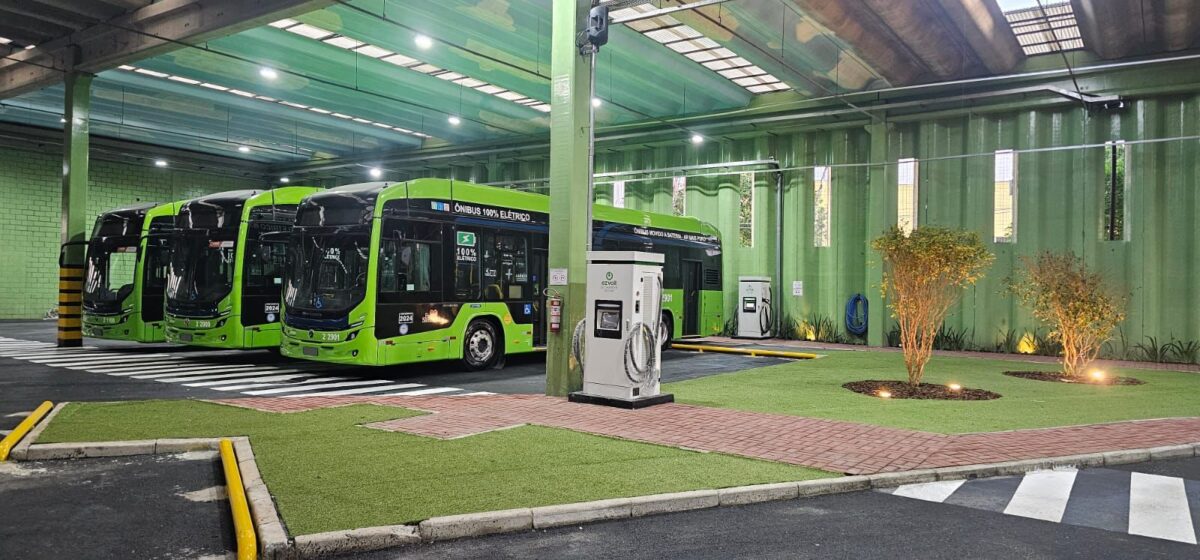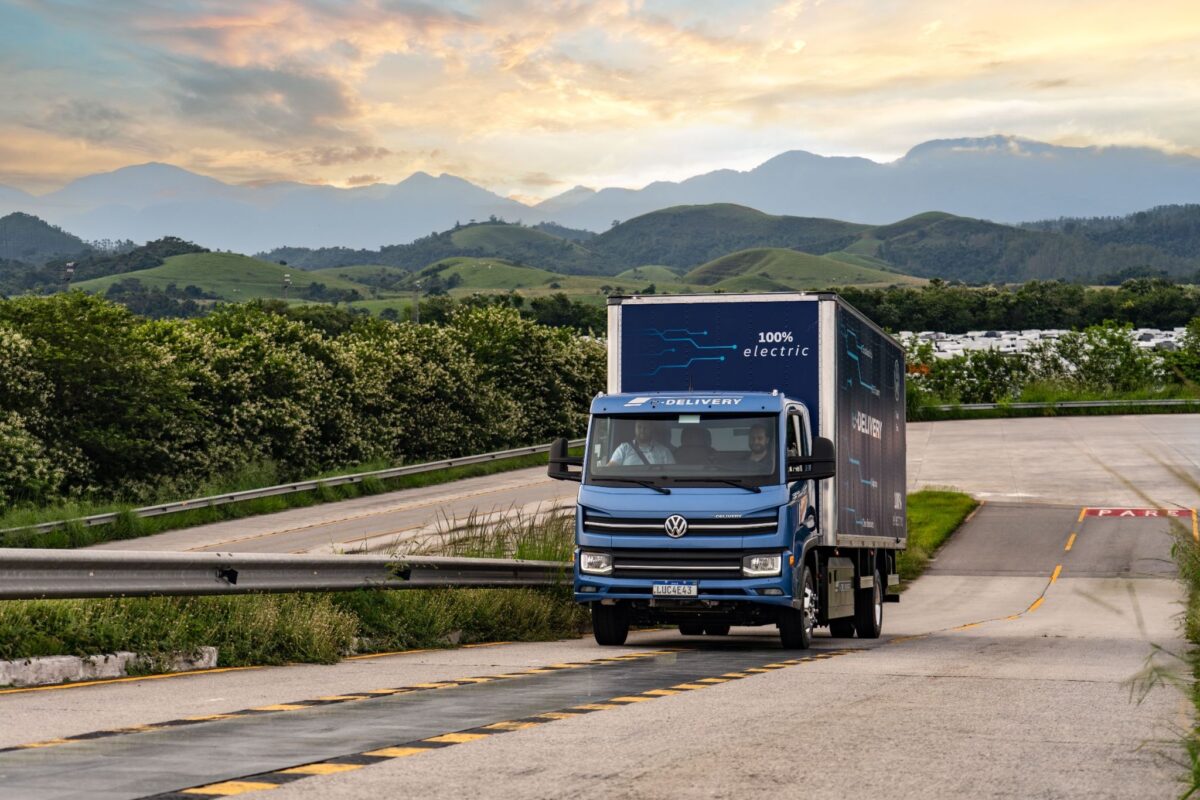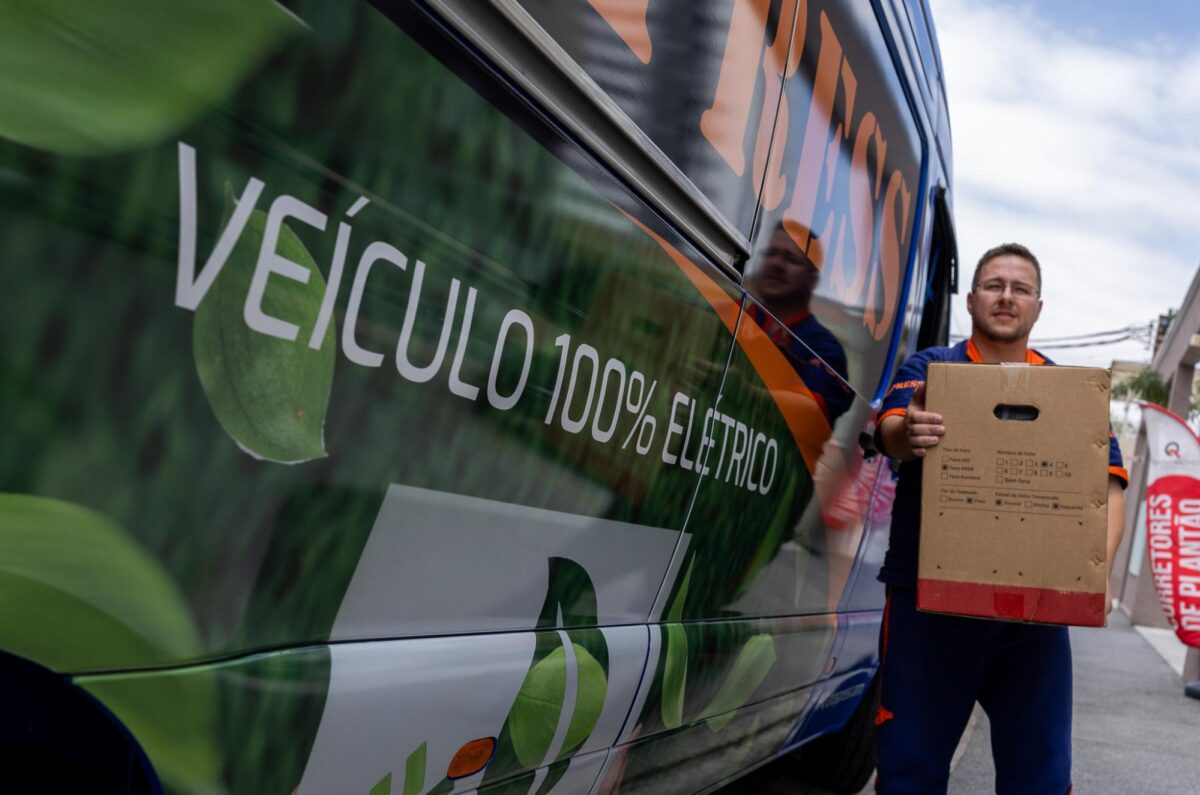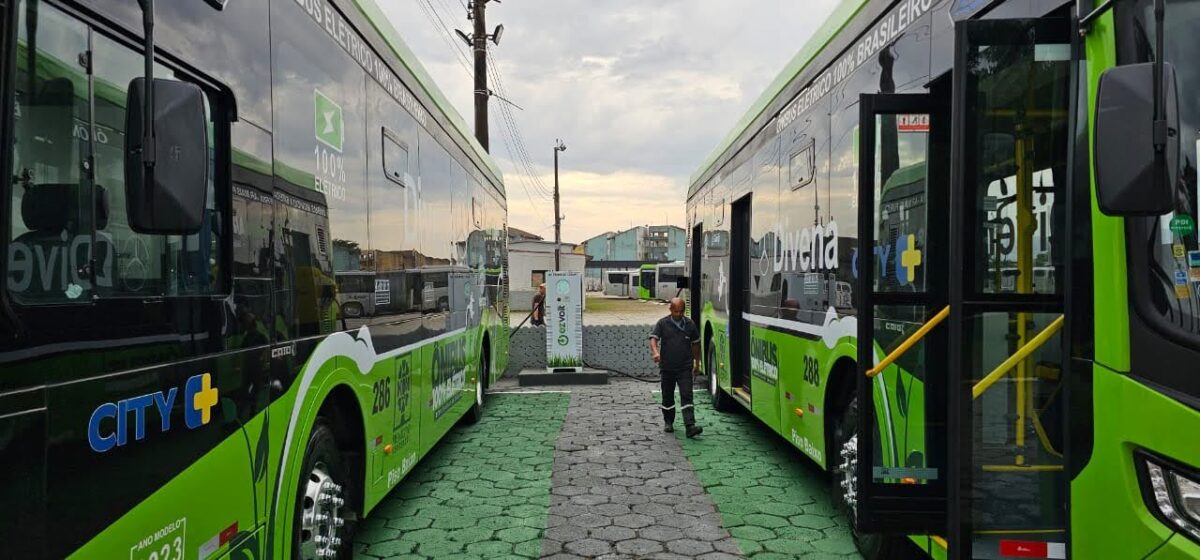Brazil takes center stage in the effort to address the climate crisis as host of COP30. The country is zeroing in on commercial vehicles and infrastructure as critical solutions that bring economic, jobs, and health benefits. This is not surprising as the transportation sector is responsible for 53.3% of the energy sector’s GHG emissions in Brazil, representing a critical sector to be addressed now as the country works to reach net-zero by 2050. Below are a few of the highlights and emerging programs that promise to transform Brazil’s freight and transport future.

Zero-emission bus charging in São Paulo. Photo courtesy of EZVolt.
e-FAST Brasil
e-FAST Brasil is the first national platform that brings together multiple sectors to accelerate the electrification of road freight transportation in a way that makes economic and practical sense while removing barriers to large-scale adoption. The platform connects innovators and stakeholders from across the freight and logistics value chain, including industry, financial institutions, and government. Launched in July of 2025 and inspired by e-FAST India, e-FAST Brasil is coordinated by WRI Brasil, and supported by government and NGO partners, among them the Ministry of Environment and Climate Change, Ministry of Transport, the Shakti Foundation, and CALSTART/Drive to Zero. One of the platform’s top stated initiatives is to accelerate the first Global Green Road Corridor in Latin America.

São Paulo – Registros fotográficos relacionados a descarbonização do transporte urbano de carga na Região Metropolitana de São Paulo, incluindo fotos no trânsito da capital e fotos da transportadora Braspress, incluindo a matriz em Guarulhos. Photo courtesy: Roosevelt Cássio/WRI Brasil
“Recognizing that the energy transition in the transport sector depends on multiple stakeholders, it becomes clear that all of them need to be brought into the discussion. e-FAST Brasil was designed to create this collaborative environment and to promote initiatives where different players join forces to achieve impactful change,” said Magdala Arioli, Transport Decarbonization Manager at WRI Brasil.

Volkswagen Truck & Bus e-Delivery – the first 100% electric truck designed and built in Brazil.
“One of the key foundations to building an economically viable, sustainable zero-emission transport future that benefits local communities with well-paying jobs, healthier air, and a safer climate is infrastructure for commercial vehicles,” said Stephanie Kodish, Senior Global Director of CALSTART’s Drive to Zero. “Corridors enable conditions for zero-emission medium- and heavy-duty vehicles to move people and the world’s goods from ports to hubs to cities around the globe each day. Accelerating such infrastructure is a foundational step that e-FAST Brasil is taking.”

Zero-emission van delivery vehicle and driver in Sao Paulo. Photo courtesy of Roosevelt Cássio/WRI Brasil.
Secretariat for Electric Mobility
Brazil’s national government recently announced the creation of an electromobility secretary under the Ministry of Mines and Energy, according to Inside EVs. The new electromobility secretary is expected to “consolidate public policies that promote the electrification of vehicles in the country and improve dialogue between government and industry.” Electric mobility advocates reportedly welcome the news citing the potential for greater efficiency, coordinated policies, stronger public/private action and partnerships, and much more. Ricardo Bastos, president of ABVE (Brazilian Electric Vehicle Association), publicly stated that the new secretariat will begin work as soon as a new head is appointed.
Strong local policy = Zero-emission bus sales rise
Zero-emission bus policy in the City of São Paulo, the fifth largest city in the world, is driving electric bus adoption in Brazil. The city has banned the purchase of new diesel buses, and is aiming to have a 100% zero-emission fleet by 2038, along with significant reductions in particulate matter and other pollutants. São Paulo has partnered with organizations like the World Bank to grow financing. As a result of this policy and dovetailing efforts around the country, Brazil saw a 141 percent increase in new zero-emission bus sales in the first half of 2025. In all, more than 1,380 commercial electric vehicles were sold in the country between January and July 2025, including vans, buses, and trucks according to the ABVE.

Zero-emission bus charging in São Paulo. Photo courtesy of EZVolt.
EZVolt, the largest electromobility company in Brazil, services roughly 75% of the e-bus fleets from São Paulo city.
“Electrification of logistics and public transportation fleets is inevitable and the reasons are clear: Compared with diesel-powered vehicles, electric vehicles deliver approximately 80% lower operating costs, 80% to over 100% higher energy efficiency, greater comfort for passengers and drivers, and the elimination of particulate matter, polluting gases, and CO2. It’s as logical a choice as the shift from horse-drawn transport to motor vehicles about two centuries ago,” said Gustavo Tannure, CEO of EZVolt.
In addition to leading commercial vehicle charging in Brazil, EZVolt is a private sector endorser of the Global Memorandum of Understanding on Zero-Emission Medium- and Heavy-Duty Vehicles (Global MoU) —which is a leading effort to decarbonize global freight and transport. Nearly 300 industry leaders, subnational governments, and organizations endorse the ambitious Global MoU agreement and 40 national governments are signatories to it. The Global MoU, co-led by CALSTART/Drive to Zero and Colombia, aims to support countries in reaching 100% new zero-emission truck and bus sales by 2040.
MOVER program
In 2024, Brazil launched the MOVER program (Programa Nacional de Mobilidade Verde e Inovação), which is the first of its kind to regulate emissions from the heavy-duty transportation sector (with specific regulations expected for 2027/8). It offers significant incentives for innovation, while also creating new requirements for vehicle energy efficiency and emissions. To learn more about MOVER, visit the Programa MOVER website.

Zero-emission DHL truck charges in São Paulo. Photo courtesy of EZVolt.
Charging Up Change
Learn more about Brazil’s efforts to transform fleets, cut pollution, and create healthier air and environment via Charging Up Change: Brazil.
The Charging Up Change series features the stories of the people and companies that are changing global transportation for good. The series is brought to you by CALSTART’s Drive to Zero program. Drive to Zero, in partnership with the government of Colombia, co-leads an ambitious community of 40 countries and nearly 300 private sector and subnational endorsers that support reaching 100% new zero-emission truck and bus sales by the year 2040. Companies and subnational governments looking to accelerate innovation, grow jobs as well as economic and energy security are invited to endorse the Global MOU today!
To learn more about the real people and companies who are “Charging Up Change” visit the Drive to Zero website.
